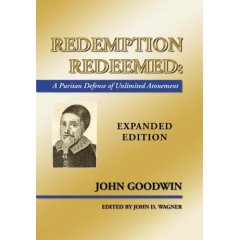John Goodwin
Calvinist, Charles Spurgeon, writes: “Go and buy any puritanical book, and see if you can find Arminianism in it. Search all the book stalls over, and see if you can find one large folio book of olden times that [has] anything in it but the doctrine of the free grace of God.” (Sovereign Grace and Man’s Responsibility)
Had Spurgeon never heard of the Puritan, John Goodwin?
John Goodwin writes: “And whether that doctrine, which teacheth that God intendeth only the salvation of a few, but the condemnation of many, and yet commandeth all to believe that they may be saved, doth not make the glorious gospel of God like unto one of such lotteries, I leave to all understanding and unprejudice men to consider.” (Redemption Redeemed, pp.140-141)

John Goodwin (1593-1665), the eminent English pastor and Puritan divine, was a man ahead of his time.
Educated at Cambridge University, he was raised and indoctrinated in Calvinistic absolute predestination, the dominant Christian perspective of his day. In the 1640’s he began preparing for a series of lectures to refute the doctrines of Arminianism, and entered a thorough investigation of the controversy and its many aspects. The ultimate result was his rejection of Calvinism and adoption of Arminian theology.
He completed Redemption Redeemed in 1650 and published it the following year. The original version was a multi-issue polemic against Calvinism. This edition, replacing a shorter 2001 version, offers the fuller text of the chapters devoted to a comprehensive refutation of the limited atonement doctrine. Goodwin’s writing remains to this day a superb and eloquent defense of the Biblical position of unlimited atonement that Jesus Christ “by the grace of God tasted death for every man.”
Goodwin represented an Arminian strand of Puritanism and was a major figure in the decline of Calvinistic influence in England. In the contemporary period as Christians enter the 21st Century and Calvinism with its disturbing implications is making a resurgence, Goodwin’s master work is a welcome and much needed contribution to those seeking to understanding the truths of God’s word.
John D. Wagner
Editor
